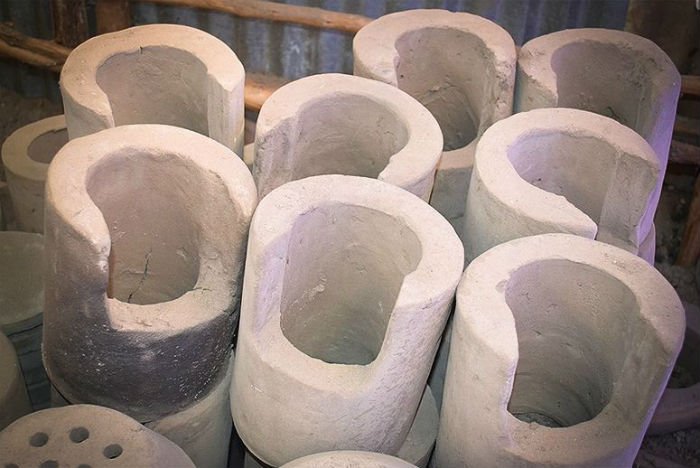
In many parts of the world, preparing a meal isn’t as simple as grabbing a few things out of the refrigerator and turning on the stove. No, first you have to find something to burn in order to cook your food.
About 2.5 billion people worldwide depend on biomass materials such as wood, charcoal, and animal dung to meet their energy needs to cook the day’s meals over a traditional three-stone wood fire. It’s a method so inefficient that only 10 percent of heat is transferred to the cook surface, yet this is how Ethiopia’s 94 million people make their spongy injera every day—as well as more than 600,000 Sudanese, Somali, and Eritrean refugees who live in the country, all of whom risk their health and safety every day just by cooking.
“Cooking is always a big challenge, not only at refugee camps but in the rural communities as well,” said Konjit Negussu, who has 10 years of development experience in Africa. “To get firewood, they have to travel four to eight hours per day or every other day. Girls are not going to school because in Ethiopia, cooking is done by women and girls, and they are responsible for getting firewood for households. It has linkage with so many social elements.”
Negussu, along with her colleague Rekik Bekele, is the cofounder of RK Renew Energy PLC, winner of a 2015 SEED Award in the energy sector. The grants go to locally led social and environmental start-ups in countries with developing economies. In Ethiopia, RK Renew Energy’s goal is to empower impoverished local women to produce and sell fuel-efficient stoves to rural communities and refugee camps, where demand is high.
“Getting wood is always a big challenge. Sometimes they sell their food ration to get fuel,” Negussu said. There are stoves available in the markets for refugees, but at 250 Ethiopian birr—about $12—in a country where the per capita average is only $550 annually, they are expensive. The clay cookstove RK Renew Energy proposes costs one-fourth the price and uses 50 percent less energy than the traditional three-stone stove.

“If we can provide a new stove that has similar fuel-saving efficiency with a lower price, we think we can win the market,” Negussu said.
Winning the market, in this case, has a triple bottom line, with environmental and social benefits. The reliance on wood for preparing food has led to the destruction of Ethiopia’s trees. Eucalyptus trees replaced the country’s old-growth slopes of juniper, acacia, and kosso trees and have been cut, harvested, and cut again. The high forests that used to cover 16 percent of the land in the early 1950s were reduced to 3.6 percent in the early 1980s and further declined to 2.7 percent in the early 1990s, the Food and Agriculture Organization of the United Nations reported. By distributing 55,000 stoves annually, the company will reduce carbon emissions by 260,000 tons and save 240,000 tons of fuelwood each year.
As the need for firewood outpaces deforestation,women and girls responsible for obtaining fuel are forced to walk greater distances to get what they need. Doing so puts them at risk for being assaulted and raped.
“They can pull you into the thorns, hurt all your body, tear all your clothes and leave you with wounds,” a woman in Uganda told the World Food Programme. “I know of women in this community who have been killed by warriors. In fact, all of us—young girls and adult women who collect firewood—are all at high risk.”

Reducing smoke within the home will save lives too. The World Health Report identified indoor air pollution as the single largest environmental risk factor for female mortality and the principal culprit for childhood mortality from acute respiratory infections, the leading cause of child deaths worldwide. Still, even reduced smoke in the home presents a health risk. “As yet, no biomass stove in the world is clean enough to be truly health protective in household use,” Kirk Smith, a professor at the University of California, Berkeley, who researches cookstoves, recently told The Washington Post.
Negussu said RK Renew Energy’s efforts to use an energy-efficient kiln to fire the stoves themselves will conserve additional energy, setting the company apart from others in the field and making its efforts more impactful overall. “When you consume a lot of energy during production, it’s all the same. It gets back to zero,” she said.
It all adds up to increased safety, health, and food security for women in Ethiopia’s refugee camps and villages. In the camps, RK Renew Energy has partnered with development groups GIZ, HoA-REC&N, and SNV, as well as the country’s ministry of water, irrigation and energy, to distribute a million stoves in the next five years—created and sold by women.
“We want to hire women and create jobs for them, for those who can produce the stoves and those who can be a retailer or promoter. They can make money from the sales they can get,” Negussu said.
This article was written by Sarah McColl of TakePart.